Livestreaming is replacing TVs - Issue 1
Black Mirror Bandersnatch, live audiences deciding the plot, and its impact on decision theory.
1. You can spend more than 24 hours on online media today
The media scene is being upended today. It is simple to see why.
More screens than ever.
An average consumer has a phone, a tablet, a computer, a television, and perhaps more desktop screens than ever.
There are Instagram accounts teaching you how to create your own perfect workspace with multiple screens, and makes the gaming setup the norm for any guy worth his mancave.
More entertainment options than ever.
For every Tik Tok, there is 小红书,快手, Glance, Zynn, Instagram and YouTube.
For every Netflix, there is Disney+, Apple TV+, Amazon Prime Now, Hulu.
And more importantly, more “leisure time” than ever which was once time for going out with friends, to the movies or to the park
Although all of us have only 24 hours, these three situations have radically transformed how the 24 hours is used:
More screens than ever -> Ability to consume more than 24 hours of content, with passive consumption and second/third screens playing in the background.
More entertainment options than ever -> More incentive to spend time on better quality content, plus the network effect of having to watch series to be social and engage in conversations
More “leisure time” spent on the screen -> Lack of substitutions, and an increase in complementary online entertainment & media increases stickiness and makes this more of the norm
This culminates to a reality where you can watch > 24 hours of content a day if you truly wanted to.
2. Enter Bandersnatch, where you can decide how the plot ends up
The idea of deciding how plots end up is not a new thing. We had these “Choose your own Adventure” books back in primary school. Fantasy driven with a dose of reality - you were the protaganist searching for the abominable snowman, or finding the lost Mayan civilisation. You read a few pages from the beginning and are then faced with 3 options. For each option, you then flip to a decided page number in the book to continue the plot, and are then faced with another 3 options, and you flip to the page to continue the story; and so on.
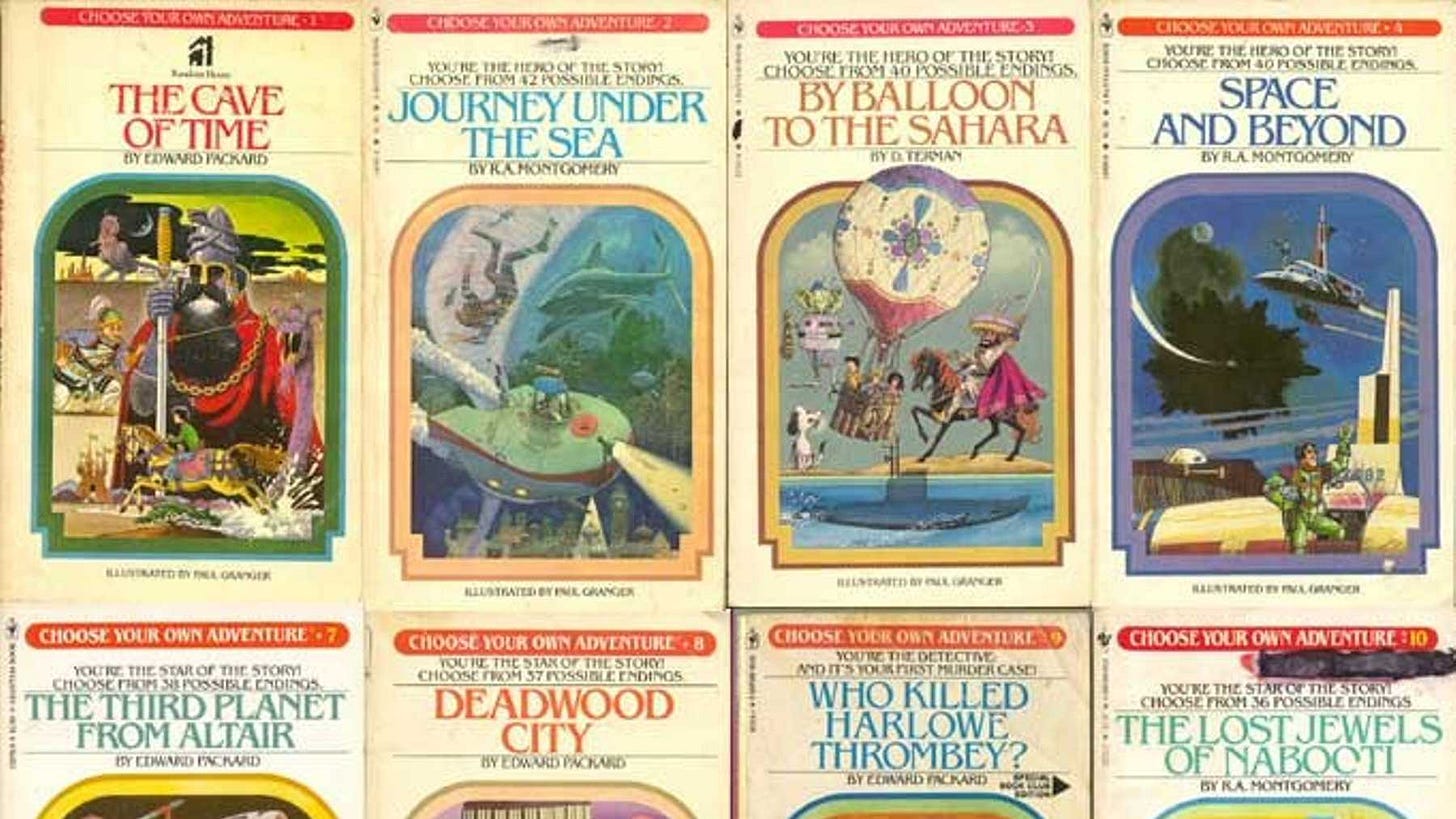
I loved these books as a kid.
You were always constantly thinking “what if”, and then you circle back to the start, and try to find a storyline and the consequences that you enjoy. I started drawing decision trees to make sense of the many endings in the book, just to find an optimal ending that I enjoyed. I found it so marvelous that the authors could jumble up the book and yet piece them all together as a whole.
As the new children of the world (the young millennials and Gen Z as we call them today) were born into a digital native world, the books and libraries I once knew as entertainment were replaced by “more entertaining entertainment”. Characters that came alive on the screen.
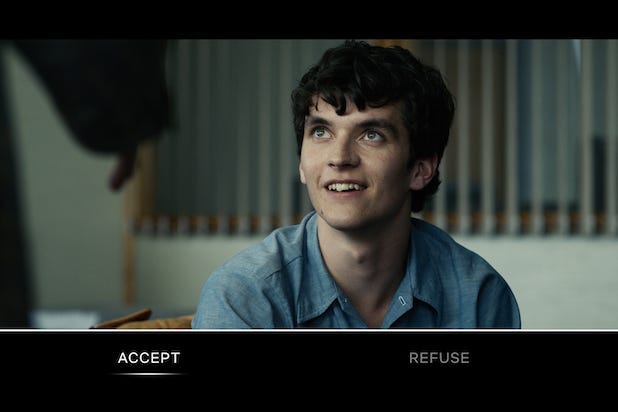
In 2018, Netflix’s Black Mirror released a standalone interactive film Bandersnatch. It was like your Choose your adventure series come to live on screen.
You start watching the movie, and at each critical juncture, you are given a set of options. You have 10 seconds to choose, or else a default option will be chosen for you. Decision wise, you get to circle through 5 “main” endings on screen.
The difference between the book and the screen? You have the full immersive experience of visuals and sound.
Easter eggs are again a must, but they were also present in books before and is not novel. These “golden eggs” pay tribute to the super hardcore fans who were “in the know” about several motifs and metaphors used.
How the movie could have gone further than the book is this:
Gamification: gain trophies to unlock scenes
Escape room-ish games: putting more riddles to be solved in the plot
Collaborative style: giving the option for viewers to do a “watch party” similar to what we have on Facebook, and put them in various roles to solve the puzzle (where one needs to turn a key, and another cranks the wheel for example)
These ideas are super interesting as various entertainment houses jostle for the limited capacity of 24 hours (or more now) of screen time every consumer has.
3. Throw in democratic decision making into the mix
Bandersnatch, although interesting and immersive, is merely a screen version of the books we read in the past. There was nothing new in the mix.
One platform has broke past that to create a new way of interacting with the content.
Twitch, the #1 live-streaming platform in the world that was initially created for gamers, seems to have found the secret sauce.
The philosophy behind gaming from Boomers to Gen Z are not that different
You see - live-streaming is a relatively new concept, backed by an old philosophy. What is this old philosophy? The idea of people watching others play games is not a new thing. When our parents in Singapore did not have the money to buy marbles. They shared. Some played first, while others watched. And when you watch you are not silent.
You’re critiquing on how he should have used more power to flick the marble, the angles and the strategy.
You’re comparing the players, and also comparing yourself to them when you start playing in the next round - am I better than them, or is this an easy game?
Millennials did the same thing. We had only one computer those days. Gameboy consoles were not as multiplayer as it is today. You watched others play Starcraft or Pokemon. Even for the consoles, I still remember PS1 only having 2 controllers. The others had to watch.
And you did the same thing your parents did. You critiqued. You compared.
And today, the Gen Z with their eyes glued to their phones from birth are doing the same thing. They don’t face the same shortage of resources (marbles, consoles, controllers, devices) as us. However, they still want to watch the best people play. They still critique, they still compare.
And that was the rise of Twitch. Watch others play DoTA 2, League of Legends and FortNite. Watch the best teams. The best teams become similar to soccer stars. Brands start sponsoring them to get eye-balls & traction. They become ad revenue.
The secret sauce of interacting with others, to interact with the content
Twitch has entered the Netflix market through an adjacency, and it has brought with it a secret sauce that neither of these other players (Disney+, Viu etc.) has had the network effect or capability to build within a short amount of time.
They bring the twin ideas of critiquing and comparing to how content is being interacted with.
To critique and compare today, you need to have a place where your voice is heard. You have a chatbox. I am reminded of my wife who I dislike watching movies with, because she will be constantly asking why this character is doing this; is he bad; why is he bad and what he did. You know the person that you won’t go to the movie with? But that’s exactly what Twitch did very well in - they made watching movies a truly social activity without getting annoyed by incessant questions.
And they did so, by allowing the audience to democratically decide how the plot is going to go.
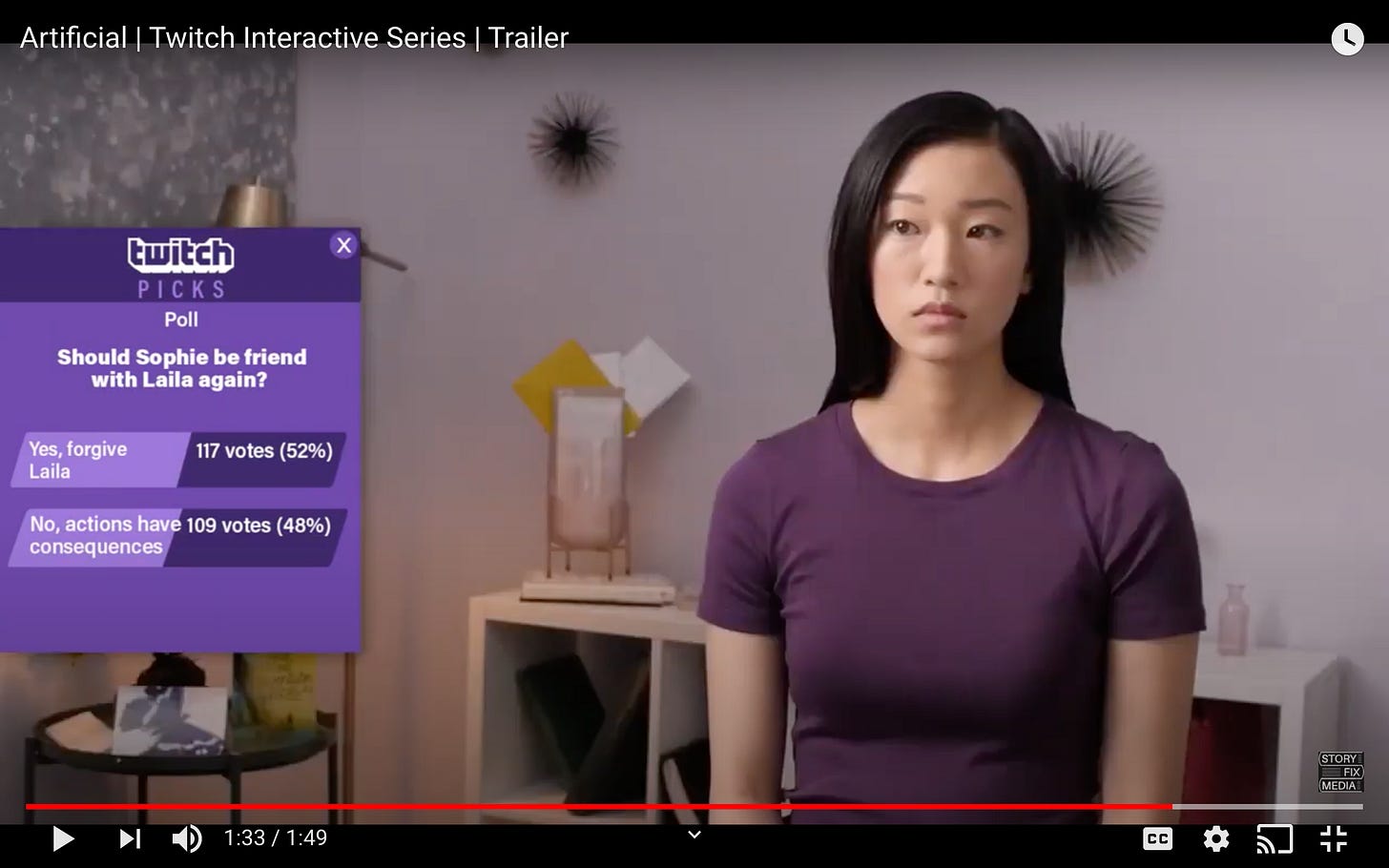
Audience can vote on options and majority wins, whether Sophie be friends with Laila again.
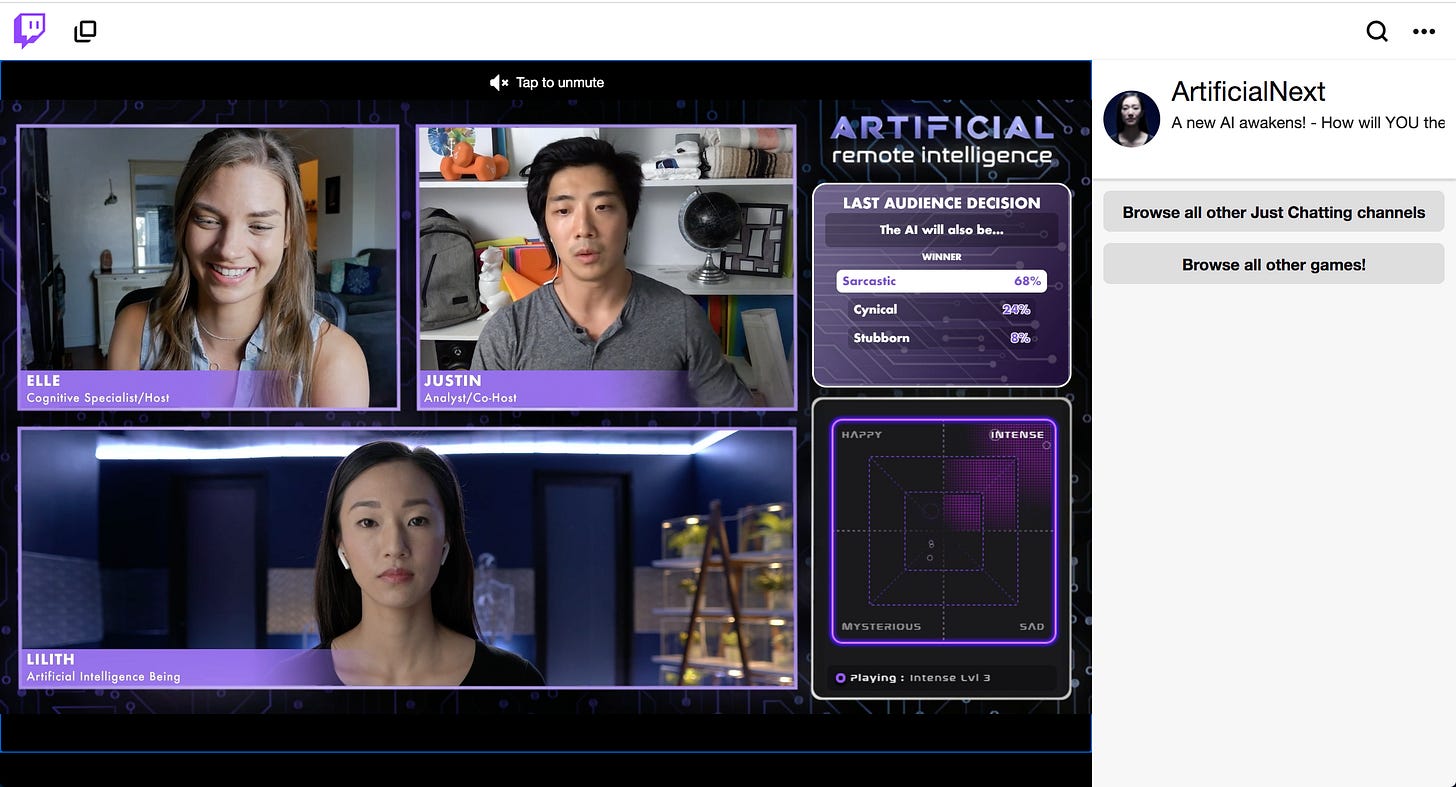
The audience decides live whether the AI will be sarcastic, cynical or stubborn via polling.
Now this is the breakthrough. Previously, you alone decided the plot. Now, it is the democratic opinion of the masses to how the plot is being decided. Majority votes to the choice wins and this is how the movie will go.
When that happens, of course you’d speak in the chat. You’d shout your loudest to make sure your voice is heard and you want to see the plot go to your decision.
The “permanency” of democratic decisions
How this is different from Bandersnatch is also because you can’t flip the pages of the book or rewind your decisions on the screen to figure out the 5 alternate endings.
You have to live with the consequences of what the other people across the world watching this series with you has decided upon. It mimics reality in a way because you can’t reverse on decisions made, and consider the other decision trees that “could have been”. Until the series is over and the producer releases the other alternate endings that have been filmed, you will not be able to weigh out fully the decisions made.
This is the power of live-streaming.
You are making live decisions together with others whom you don’t know, but still chat with, to collectively decide the outcome to a movie.
Now, that’s the ultimate immersive experience.
4. Make the music as close to the audience’s live true emotions as possible
If you missed it earlier, I will point it out to you on the Twitch platform:
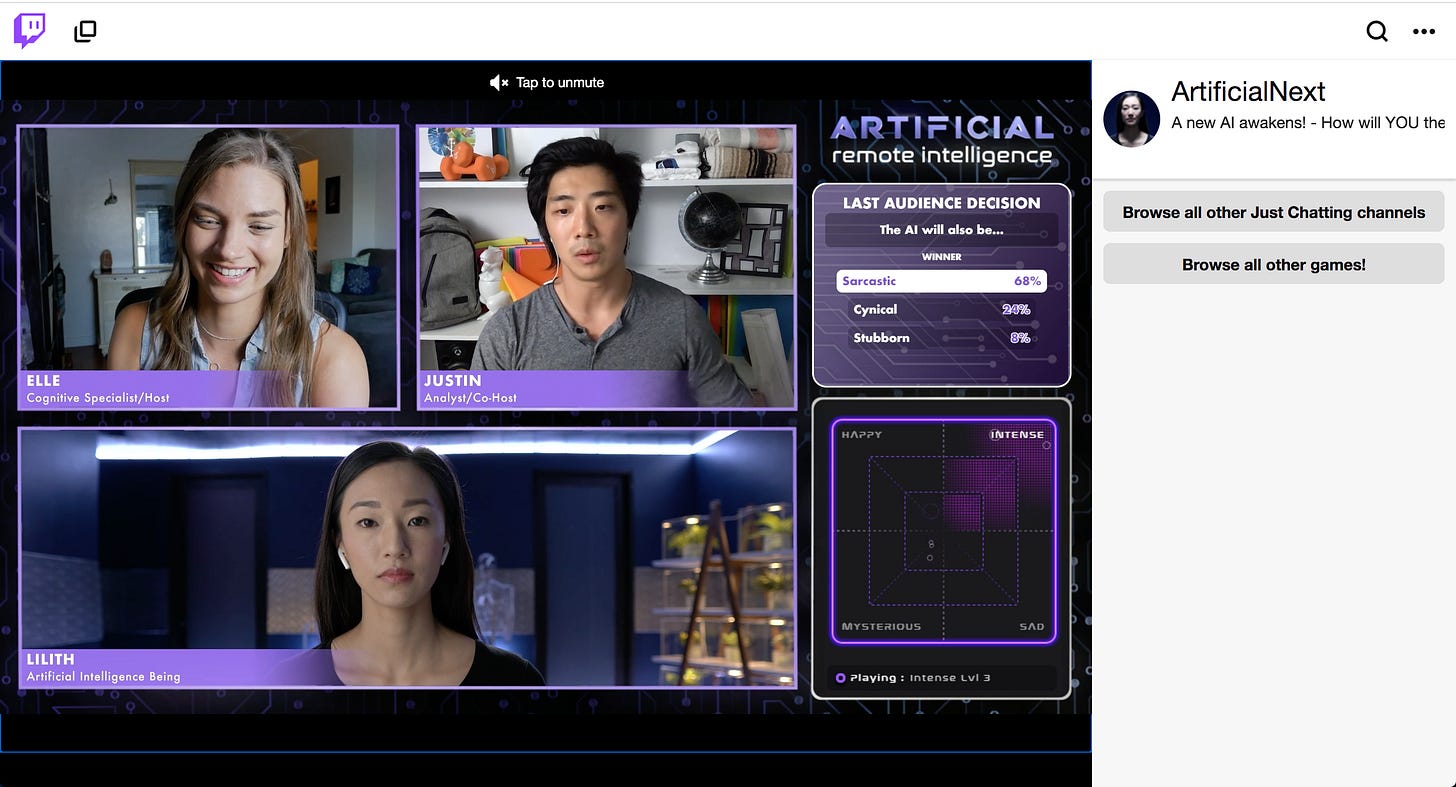
At the bottom right, there’s 4 emotions - happy, intense, mysterious and sad.
These correspond to the music that is played during the scene. You can have a spectrum of how happy the music can be, from semi happy to very happy.
How this works is that the AI processes the comments in the chatbox to determine the music played to fit the emotions from what is being discussed.
This music is dislodged from the acting/production, and is LIVE. As an audience, what you say and respond to others determines the music, and with a 6-7 second lag feedback loop, gives a true representation of what the real mood of the audience is feeling at that point of time while watching the movie.
Honestly - talk about REAL immersive experiences. You have music that’s catered to the audience in real time according to what they express and feel.
It is no wonder that Twitch has 15m average daily users and between 2.2m to 3.2m average unique monthly broadcasters (2018 data).
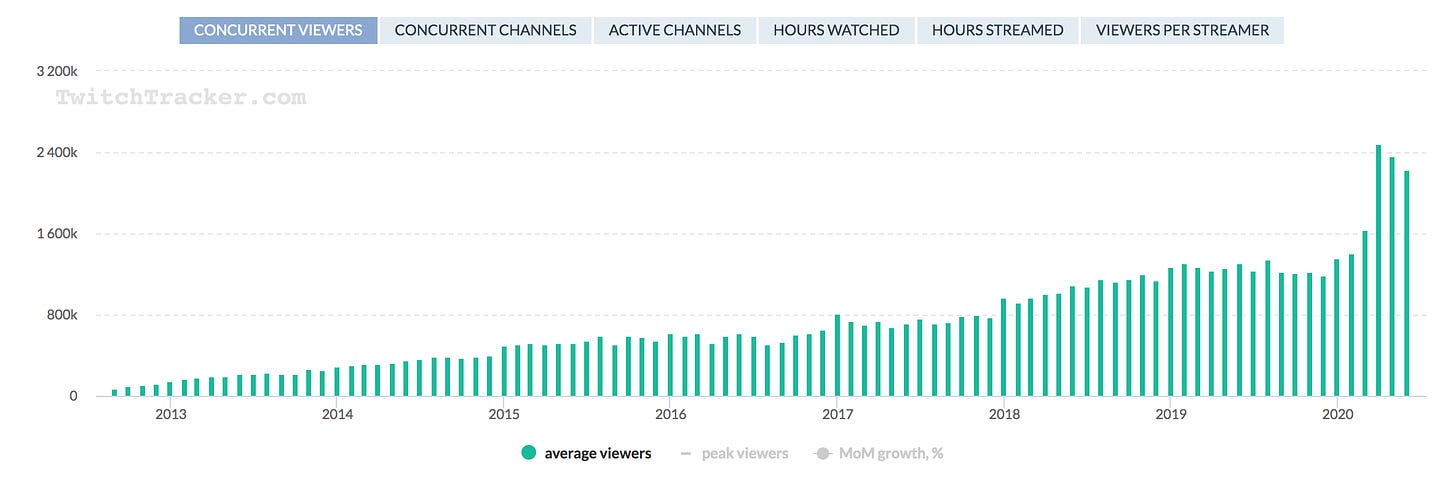
Average users have shot up 56% m-o-m from Mar 2020 to 2.5m in Apr 2020 due to the lockdowns. Mind you - this is 2.5m viewers at each point of time.
5. Dystopian literature Fahrenheit 451 has predicted this all, and includes the moral implications
I still recall my secondary school literature teacher exclaiming how accurate Ray Bradbury’s predictions were. Back then, I was scared. Today 11 years later, I am terrified.
The description and prediction of how online entertainment will change our lives is eerily similar to our current reality. What’s more surprising is that this book was written in 1953, when microprocessors were not a thing yet. Your iPhone has more processing speed than the technology used to send man to the moon!
Entire walls in homes are replaced by screens. They project loud and bombastic characters on screen, that do ridiculous acts just for laughs and entertainment.
Ray Bradbury did get this right. The more I look at Tik Tok content, the more I think to myself how ridiculous they are.
One fact some people might think he got wrong is that these screens don’t cost 1/3 of one’s yearly salary. We have phones that are so cheap that they’re ubiquitous. But we’re talking about Singapore here. In the Philippines in Manila during Christmas, there are tons of those from the slums who come out begging. Their first purchases despite their situation is a smart phone (which cost > 1/3 of their yearly “salary”). It is no wonder the e-sports market in the Philippines is booming!
But this qualitative data point gives support to the idea that we value the things and people on screen more than our family just as how Montag jokes with Mildred how the characters on screen are “her family”; we value technology and entertainment over our own lives.
It becomes a way of escape, not to think of our lives and how miserable we are, and like the poem of Carol Ann Duffy where the protaganist watches TV to see how skinny the person on screen is and lives vicariously through her.
6. Big data daddy knowing how we make decisions in every small detail
Truly immersive experiences mean that we surrender and tell others what we truly feel. That is why we feel so good when we can trust someone and share deeply with the person.
But can you trust big data daddy? Can you trust Twitch daddy that is also owned by Amazon, which trades > 100 P/E ratio and knows everything about you in what you buy on e-commerce, or what data you have with their extensive collection of Amazon Web Services data centers?
Understanding how we tick
Twitch not only knows what we would do when we are in Sophie’s shoes - will we forgive our friends, or will we not.
Twitch not only knows what our favourite colours are - there was an episode where you decided Sophie’s favourite colour.
Twitch not only knows how you respond to others in real life through the chatbox function, and can generate music to influence how you feel.
The illusion of choice
The scariest part of this entire new dawn of entertainment, and livestreaming taking over the TV - is that the plot of Bandersnatch is coming to live.
Bandersnatch touched on the motifs of free will and the paradox of choice. Do we really have our own choice, or are the decision sets pre-determined?
In Bandersnatch and in ArtificialNext (by Twitch), it is exciting to create your own ending. It presumes a certain free will you exercise. But soon you will realise that the options are already pre-set. The film crew has already decided what the options were. Your ability to control the outcome is limited.
Pushing the boundaries for decision theory
Decision theory has been one of my favourite topics in advanced microeconomics, beyond game theory and stochastic orders. It is prevalent in almost every application on your phone.
To explain decision theory using the simplest way. Singapore uses the default opt-in function to make sure that you donate your organs when you die. If you want to opt-out, you have to go through a search cost and hassle of opting out. The opt-in/opt-out function is a simple decision theory trick on your brain that forces you to opt-in because you are lazy to opt-out.
Similarly, your food delivery apps also do the same. They use time discounts to pressure you to purchase from a certain store within 5 minutes for a 20% discount and once you exit that and look for other food options, the discount is invalid.
Livestreaming has one upped Google and Facebook
How livestreaming has beaten Google and Facebook to the data game is this. They now make you live out the life of another person as if it were yours, to figure out how you will actually decide in real life, and push out targeted pings that influence your daily decision making processes on what you eat and what you wear and who you think are idols.
If that’s not the best data source ever, what is?


